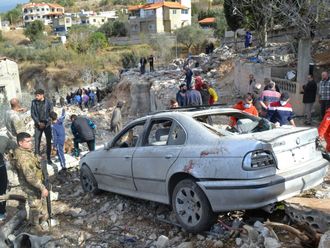Ramallah: The Palestinian Parliamentary Committee against the Israeli Segregation Barrier and Colonies is in the final stage of boycotting the Israeli courts.
Palestinians with barrier-related complaints will approach international courts instead, said a top parliamentary official.
Speaking to Gulf News, Walid Assaf, a member of the Palestinian Legislative Council and head of the council's committee against the barrier and colonies said that the option of replacing Israeli courts with international courts in all colonies and barrier related complaints is currently under final review.
"We are studying currently total termination of all kind of dealings with the Israeli courts which basically belong to the occupier and never delivered the Palestinians with fair verdicts," he said.
"All Palestinian complains related to Israeli colonies and the segregation barrier should be reviewed by fair and unbiased international courts, not Israeli," he stressed.
Assaf said that the committee helps the Palestinian land owners to scan their lands and fix their borders, use all the possible means to come up with the official documents to prove their ownership of the lands and financially help those Palestinians to hire lawyers to represent them at international courts.
He said that the committee has tried this successful method and lodged complaints against the Israeli Light Train in Jerusalem and lodged another complaint against an Israeli company which manufactures barbed-wire fences the Israelis installed around the lands which they grabbed from their Palestinian owners.
He stressed that the daily attacks of the Israeli colonists on the Palestinian properties and holy sites can not be solved internally, but they should be addressed by international courts.
"We should face the colonists' aggression and attacks by quick political movement and use of the international courts, after the Israeli courts proved to be useless and had never brought a single issue to an end," he said.
"This trend will gain momentum with the Palestinian factions in Cairo agreeing to renew the activities of the Palestinian Legislative Council," he said.
Renewing parliamentary activities
Renewing the activities of the already expired Palestinian Legislative Council should be an agreed upon issue among the various Palestinian factions holding unity talks in Cairo, said Assaf.
"The official tenure of the current Palestinian Legislative Council is already over, but the council can gain legitimacy within the framework of the Palestinian reconciliation," he said, stressing that the council can run for an additional limited agreed upon time to review agreed upon issues.
"This council can handle specific issues like the Palestinian election law which is necessary for the Palestinian political life as the Palestinians are few months away from their presidential and parliamentary elections," he said.
Within the council, the Palestinian way of functioning should be based and focus on Palestinian national interests not partial, he said. "Partial performance at the Palestinian Legislative Council will only deepen the Palestinian division and enhance differences," he said.
"So far, there is no specific program for the Palestinian parliament," he stressed.
As per the Palestinian law, an expired council can not convene unless the Palestinian President himself calls the council to convene and the president will have to decide about the agenda of the first session, where a new presidency for the council have to be elected. "The entire process stands in need for ultimate agreement among the Palestinian factions holding talks Cairo," he said.
Assaf said that many laws have already been imposed by presidential decrees and they are currently implemented on the ground. "The current expired council will not review those laws, but will leave that to the coming elected council as those laws have tremendous administrative, legal and financial influences," he said.












